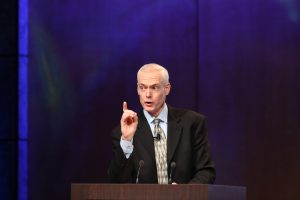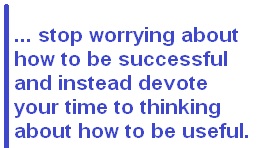
Why do some companies thrive in uncertainty, even chaos, and others do not? Author and business expert Jim Collins offered his insight on this phenomenon based on nine years of research that he and his colleague Morten Hansen collected for their new book Great by Choice: Uncertainty, Chaos and Luck – Why Some Thrive Despite Them All. Collins also shared engaging stories and rigorous analysis that enumerate the principles for building a truly great enterprise in unpredictable, tumultuous and fast-moving times.
Jim Collins, author of Built to Last, Good to Great and Great by Choice, is a student and teacher of enduring companies – how they grow, how they attain superior performance, and how good companies become great companies. Having invested more than a decade of research into the topic, Collins has written or co-written six books, including Built to Last, a fixture on the BusinessWeek best-seller list for more than six years, and the October 2011 release, Great by Choice.
Since first being introduced to Good to Great about a decade ago, Jim’s books have survived several culls of my bookshelf; they continue to resonate with my belief that great companies are built on principles and timeless values that anyone can understand. Being fortunate enough to work for a company that consistently wins awards around the world as a ‘great place to work’, I have first-hand experience of what it means to be employed by a company that translates strong values into a long track record of success.
Leading into Jim's presentation, the audience was polled and 45 percent of the audience answered that their organisation is being significantly affected by strong external forces; this is something that Jim wanted to address. He is, like SAS, "in love with data." His research has always been firmly grounded in empirical data. His method is to look at the contrasts between the businesses in his huge database of corporate data and determine what sets apart the great (the companies that consistently deliver superior results).
Make the right choices
In Jim's latest book Good to Great, he builds on his insights from what makes good companies great, what causes great companies to fall and has reached the conclusion that greatness is not a function of circumstance; it is a function of choice and discipline. After all, why do some businesses thrive and others fail when they operate in the same economic climate. After nine years of research, Jim has shown that this is what sets apart the great from good (delivering 10 times the performance).
Firstly, get the right people says Jim - then figure out where you want to go; this is the only way to deal with an uncertain world. You need flexible, committed, disciplined people to be adaptable enough to prevail in uncertainty. He said this is something he admires about SAS; the company invests in its people and culture, even in a tough market. It also has the discipline to stick to its course when others are constantly telling it to emulate its peers and competitors but Jim Goodnight has the visions and discipline to stick to his core values.
Then talking about leadership; Jim says the first, most important skill of management is knowing how to pick the right people. He says that leaders do not need charismatic personalities - leaders preserve and build on their culture; in the face of adversity, they have the humility to know that leaders also need to be custodians of something greater than themselves. They have purpose that is bigger than themselves and is founded on their people.
Be humble, be 'care'ful
 In How the Mighty Fall, Jim talked about how failure can follow the hubris borne of success - that great companies sometimes feel they have a divine right to survive without attending to their culture and people. He said they sometimes forget that sense of purpose that made them great in the first place. The mighty often fall because they overreach themselves and do not have the will and discipline to prevail. This reminded me of one of my favourite posters "stay calm and carry on" - the disciplined leader does not give in to panic when things start to go wrong.
In How the Mighty Fall, Jim talked about how failure can follow the hubris borne of success - that great companies sometimes feel they have a divine right to survive without attending to their culture and people. He said they sometimes forget that sense of purpose that made them great in the first place. The mighty often fall because they overreach themselves and do not have the will and discipline to prevail. This reminded me of one of my favourite posters "stay calm and carry on" - the disciplined leader does not give in to panic when things start to go wrong.
Jim then turned to his latest research which shows that humility and will are still not enough, the leadership behaviour that is exhibited in those companies that thrive in chaotic times is centred on ambition for something larger than themselves but also having fanatical discipline, empirical creativity and productive paranoia.
Fanatic discipline - Jim used the example of a company that delivered respectable but unexciting growth for every year over a 19-year journey. The company grew consistently over time because every year it delivered on target within a very small margin of error. It neither overreached itself nor exhausted itself and missed a year.
Empirical creativity - When faced with uncertainty, most people look to others for clues on what to do next, but great leaders look to the data and evidence to identify what is known to work. It takes great will and discipline to not be attracted to an innovation that has yet to be proven as a potential 'silver bullet.' There is a place for innovation, but when linked to empirical evidence, you can make bold moves that work. Empirical creativity allows leaders to first test an innovation to find a successful strategy, and then have the discipline to concentrate resources on what works whilst disregarding the unproven or unprovable.
Productive paranoia - Great leaders constantly worry about "what if?" They prepare for the worst by translating fears into contingencies that can absorb the 'slings and arrows of outrageous misfortune.' When everything else is the same, your outcomes are driven by your decisions. This reminded me of Tim Belk during the Executive panel yesterday. He said that his organisation constantly uses scenario planning. Jim pointed out that 'the only mistakes you can learn from are the ones you survive.' Contingency gives an organisation options - options that allow them to survive their mistakes.
In talking about the role of luck in business success, Jim said that this was something his team examined in his research and he concluded that great leaders don't make luck they make something of luck. They can make the most of an opportunity, but within their framework of discipline and consistency. The paradox is in how to stimulate progress whilst preserving the core. Values and principles are immutable, process and operations are constantly questioned. In my view, asking "what if?" should never result in a decision to abandon core values and discipline.
Finally, after giving the audience his ten-point plan, Jim says that when you are unsure and uncertain, stop worrying about how to be successful and instead devote your time to thinking about how to be useful.

2 Comments
Pingback: 10 tips to greatness from Jim Collins - SAS Voices
Pingback: Strategy is innovation - SAS Voices